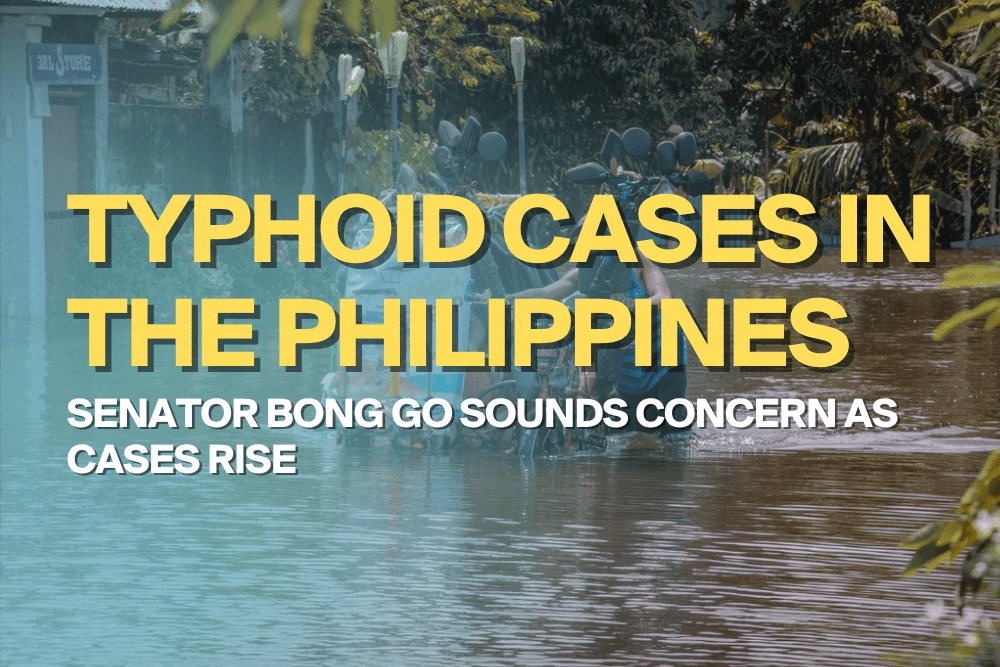Senator Christopher “Bong” Go, chairperson of the Senate Committee on Health and Demography, has expressed deep concern over the alarming increase in typhoid cases across the Philippines.
With the Department of Health (DOH) reporting 17,531 cases this year, a 38% increase compared to the same period last year, Senator Go is urging Filipinos to prioritise their health through heightened vigilance, proper hygiene, and timely medical consultation.
What is Typhoid Fever
Typhoid fever, a highly contagious bacterial infection transmitted through contaminated food and water, poses a severe threat to public health. The symptoms, including high fever, abdominal pain, and severe weakness, can become life-threatening if left untreated. The recent surge in cases, particularly in regions like Cordillera Administrative Region (CAR), Northern Mindanao, and Mimaropa, demands immediate attention and action.
Signs and Symptoms
Typhoid and paratyphoid fevers present similar, sustained fever symptoms, making accurate diagnosis crucial. These bacterial infections share common indicators such as weakness, stomach pain, headache, and digestive issues. A distinctive rash may also emerge.
Definitive identification requires blood or stool tests for Salmonella Typhi or Salmonella Paratyphi. Antibiotics are vital, but rising antibiotic resistance calls for careful selection. Untreated cases can lead to prolonged fever, severe complications, and even fatalities.
Treatment and Prevention
The treatment that is advised for patients who have typhoid fever is taking antibiotic medication. Strict adherence to medical recommendations is crucial. This includes completing the prescribed antibiotic course and adopting strict hygiene practices, such as thorough handwashing after using the bathroom. Individuals being treated for these diseases should refrain from preparing or serving food for others to prevent potential bacterial spread.
Call to Action
Senator Go emphasizes the need for collective action in combating the rise in typhoid cases. He urges Filipinos to be proactive about their health, advising them not to hesitate in seeking medical attention for symptoms such as fever or vomiting. Moreover, he stresses the importance of community cooperation to prevent the spread of the disease through maintaining proper cleanliness and sanitation practices.
PH Government and Health Agencies’ Role
The government and health agencies have a role in intensifying efforts to raise awareness about typhoid prevention, enhancing healthcare services, and implementing strict measures to ensure food and water safety. He highlights the role of Malasakit Centers and Super Health Centers as vital components of the country’s healthcare system.
Malasakit Centers and Super Health Centers
Malasakit Centers, initiated by Senator Go and institutionalised through Republic Act No. 11463, serve as one-stop shops for medical assistance programs. These centres streamline the process of making medical aid available by bringing together key government agencies, including DOH, DSWD, PhilHealth, and PCSO.
With 159 operational centres nationwide, the Malasakit Centers have successfully assisted over seven million Filipinos. Senator Go emphasizes their accessibility to all, stating, “Basta Pilipino ka, qualified ka sa Malasakit Center.”
Super Health Centers, on the other hand, offer a range of medical services, including consultations, diagnostic tests, and more. These centres play a crucial role in decongesting hospitals, ensuring that Filipinos receive proper medical care closer to their homes.
Funding and Future Plans
There are collaborative efforts from lawmakers and local government units in the Philippines. They are allocating sufficient funds under the DOH for 307 Super Health Centers in 2022 and 322 in 2023. This investment aims to strengthen the healthcare infrastructure, making quality medical services more accessible to the Filipino population.
Conclusion
In times of rising typhoid cases, Senator Bong Go’s call for vigilance, proper hygiene, and community cooperation is crucial. The implementation and support for Malasakit Centers and Super Health Centers contribute significantly to the nation’s efforts in combating this outbreak. By working together, Filipinos can protect their health and well-being, ensuring a resilient and healthier future for the country.

